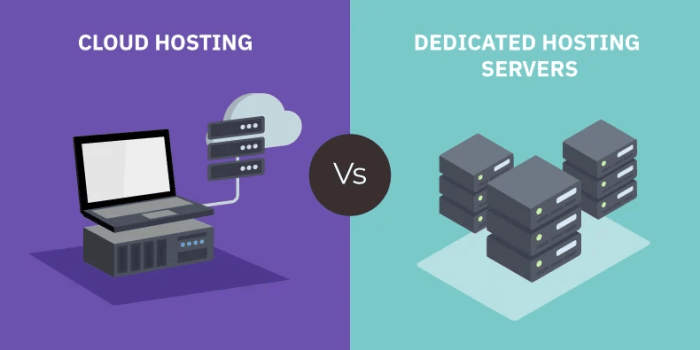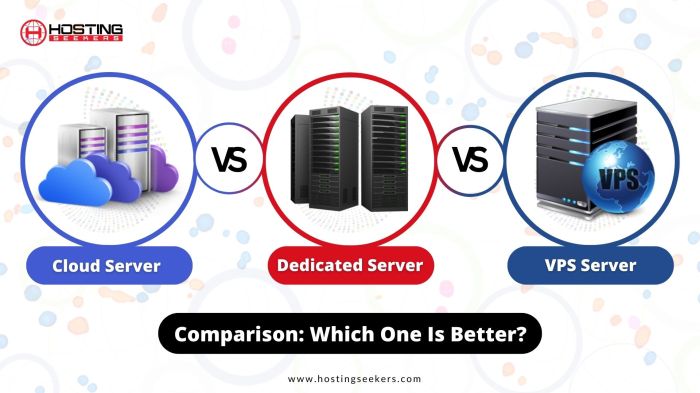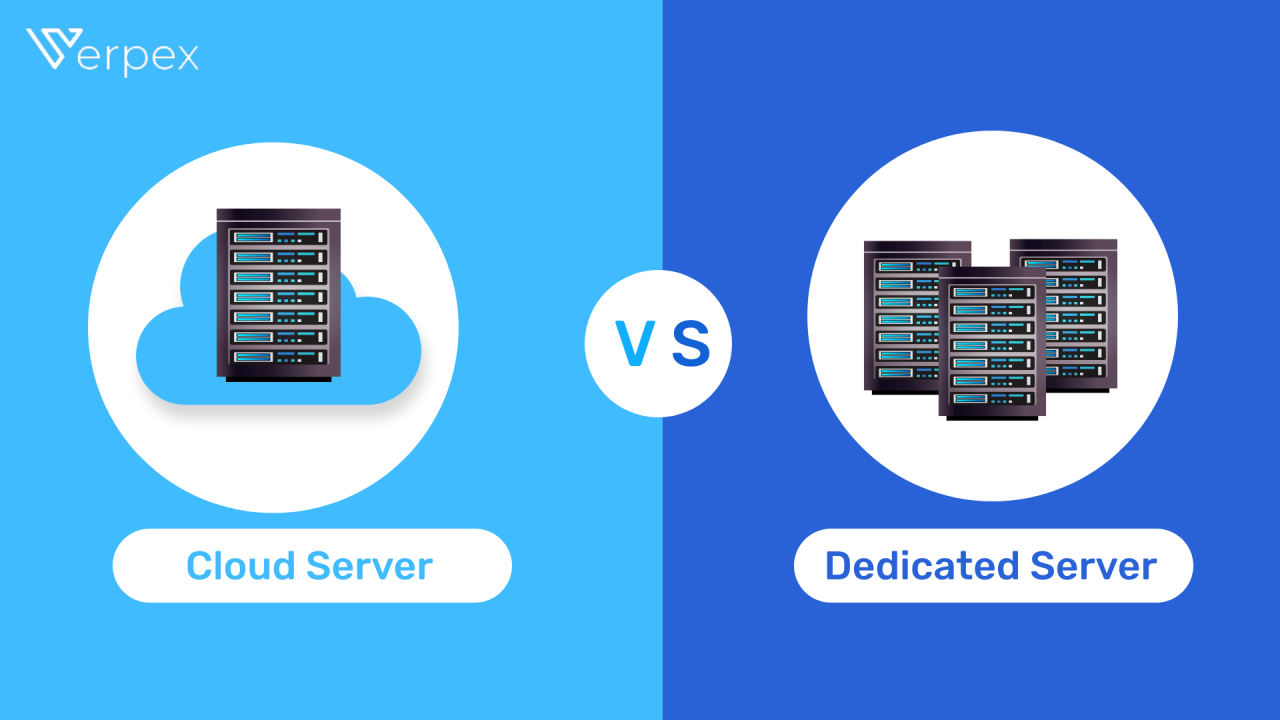Cloud hosting vs dedicated server: which is right for you? Yo, listen up, ’cause we’re about to drop some serious knowledge on the web hosting game. You know, back in the day, everyone was all about shared hosting, like, sharing a room with your whole crew.
But then, VPS came along, like, your own apartment, with more space and privacy. Now, it’s all about cloud hosting and dedicated servers, the ultimate VIP suites of the internet. But which one is right for your website?
We’re gonna break it down, so you can choose the perfect setup for your online empire.
Cloud hosting is basically like having a super-flexible, scalable, and cost-effective web hosting solution. It’s like renting a room in a giant, shared apartment building, but with way more control and features. You can easily scale your resources up or down as needed, and it’s super easy to manage.
On the other hand, dedicated servers are like owning your own mansion. You have full control over everything, but it comes with a higher price tag and more responsibility. So, which one is the right fit for you?
Let’s dive into the details and find out!
The Rise of Web Hosting Solutions

The internet has become an integral part of our lives, with businesses and individuals relying heavily on online platforms for communication, commerce, and information sharing. This reliance has driven a surge in demand for reliable and efficient web hosting solutions.
Web hosting providers play a crucial role in ensuring that websites are accessible and perform well. As the internet evolved, so too did the hosting options available, catering to diverse needs and budgets.
Evolution of Web Hosting Options
The web hosting landscape has undergone significant changes, offering a range of solutions to accommodate the evolving demands of website owners.
- Shared Hosting: This entry-level option is ideal for basic websites with low traffic. Multiple websites share the same server resources, making it a cost-effective choice. However, performance can be affected by the activity of other websites on the server.
- VPS (Virtual Private Server): VPS hosting provides a virtualized server environment, offering greater control and resources than shared hosting. Each VPS user has dedicated resources, ensuring better performance and security. It is a suitable option for websites with moderate traffic and resource demands.
- Dedicated Servers: This high-end solution provides a physical server dedicated solely to one website. Dedicated servers offer maximum performance, security, and control, making them ideal for high-traffic websites, demanding applications, and businesses with critical data.
Cloud Hosting: The Future of Web Hosting
Cloud hosting has emerged as a game-changer in the web hosting industry, offering several advantages over traditional hosting options. Cloud hosting utilizes a network of interconnected servers to distribute resources, providing scalability, flexibility, and reliability.
Dedicated Servers: Cloud Hosting Vs Dedicated Server: Which Is Right For You?

A dedicated server is a physical server that is exclusively allocated to a single client. This means that the client has complete control over the server’s resources, including its hardware, operating system, and software. Dedicated servers offer a high level of performance, security, and flexibility, making them ideal for businesses with demanding workloads or specific requirements.
Dedicated Server Advantages
Dedicated servers offer several advantages over shared hosting or cloud hosting, making them a powerful option for businesses with specific needs.
- Dedicated Resources: A dedicated server provides exclusive access to all its resources, including CPU, RAM, storage, and bandwidth. This means that your website or application won’t be affected by other users on the server, ensuring optimal performance and stability.
- Complete Control: With a dedicated server, you have full control over the server’s environment. This includes the operating system, software, and security settings. You can customize the server to meet your specific requirements and preferences, providing maximum flexibility and control.
- Enhanced Security: Dedicated servers offer enhanced security compared to shared hosting. As the only user on the server, you are less susceptible to security threats from other users. Additionally, you can implement stricter security measures to protect your data and applications.
Dedicated Server Drawbacks
While dedicated servers offer significant advantages, they also come with some drawbacks that businesses should consider.
- Higher Cost: Dedicated servers are typically more expensive than shared hosting or cloud hosting due to the dedicated resources and infrastructure required. However, the cost can be justified by the increased performance, security, and control offered.
- Maintenance Responsibilities: With a dedicated server, you are responsible for maintaining the server’s hardware and software. This includes tasks such as patching, updating, and troubleshooting. You can choose to manage the server yourself or outsource these tasks to a managed service provider.
Comparing Dedicated Servers and Cloud Hosting
| Feature | Dedicated Server | Cloud Hosting |
|---|---|---|
| Resources | Dedicated and exclusive | Shared across multiple users, but scalable |
| Control | Complete control over the server environment | Limited control over the server environment |
| Security | Enhanced security due to exclusive access | Shared security measures, but potentially vulnerable to other users |
| Scalability | Limited scalability, requires additional hardware | Highly scalable, can adjust resources on demand |
| Cost | Higher initial cost, but potentially lower long-term cost | Lower initial cost, but potentially higher long-term cost depending on usage |
| Maintenance | Full responsibility for server maintenance | Managed by the cloud provider |
Factors to Consider When Choosing

Choosing between cloud hosting and a dedicated server requires a careful evaluation of your specific needs and requirements. Understanding your website’s traffic volume, resource demands, budget constraints, and technical expertise is crucial in making an informed decision.
Website Traffic and Resource Demands, Cloud hosting vs dedicated server: which is right for you?
The volume of traffic your website receives is a significant factor in determining the best hosting solution. If you anticipate high traffic volumes or experience frequent spikes, a dedicated server can provide the necessary resources to handle the load efficiently.
Conversely, cloud hosting is ideal for websites with moderate traffic, as it offers scalable resources that can be adjusted based on demand.
Budget Considerations
Budget is a key consideration for any website owner. Cloud hosting typically offers a more affordable entry point, with pay-as-you-go pricing models that allow you to scale your resources based on your needs. Dedicated servers, on the other hand, require a higher upfront investment but offer greater control and dedicated resources.
Technical Expertise
The level of technical expertise you possess will influence your decision. Dedicated servers require a higher level of technical knowledge for configuration, maintenance, and security. Cloud hosting platforms, however, are often user-friendly and provide managed services that simplify operations.
Decision-Making Flowchart
The following flowchart can help you navigate the decision-making process:* Step 1:Evaluate your website’s traffic volume and resource demands.
Step 2 Determine your budget constraints and the level of investment you are willing to make.
Step 3 Assess your technical expertise and comfort level with server management.
Step 4 If your website has high traffic, requires dedicated resources, and you have the technical expertise, a dedicated server may be the best option.
Step 5 If your website has moderate traffic, your budget is limited, and you prefer a user-friendly platform, cloud hosting is likely the better choice.
Remember, the optimal hosting solution is the one that best meets your specific needs and aligns with your budget and technical capabilities.
Case Studies and Real-World Examples

To understand the practical implications of cloud hosting and dedicated servers, it’s essential to examine real-world scenarios. This section will delve into case studies of businesses that have successfully leveraged cloud hosting, highlighting the benefits they experienced and challenges they overcame.
We will also explore situations where a dedicated server proves to be the optimal choice.
Examples of Successful Cloud Hosting Implementations
Real-world examples demonstrate the effectiveness of cloud hosting across various industries. Let’s examine a few notable instances:
- Netflix:Netflix, a global streaming giant, has successfully adopted cloud hosting to scale its infrastructure and meet the demands of millions of subscribers worldwide. By leveraging cloud services, Netflix can dynamically adjust its resources based on peak usage periods, ensuring seamless streaming experiences even during high-traffic events like movie releases.
This flexibility allows Netflix to avoid the high costs and complexities associated with traditional data centers, making it a cost-effective and scalable solution for its massive global user base.
- Airbnb:Airbnb, the online marketplace for lodging, has also embraced cloud hosting to accommodate its rapid growth and fluctuating demand. Cloud hosting allows Airbnb to scale its infrastructure on demand, ensuring a smooth user experience during peak travel seasons and holiday periods.
Additionally, cloud services provide Airbnb with the flexibility to adapt to changing market conditions and introduce new features without the limitations of traditional server infrastructure.
- Spotify:Spotify, a popular music streaming service, relies on cloud hosting to deliver its vast library of music to millions of users globally. Cloud hosting enables Spotify to manage its infrastructure efficiently, ensuring high availability and low latency for its streaming services.
The scalability of cloud services allows Spotify to accommodate the growing demand for its music streaming platform, ensuring a seamless user experience for its global subscriber base.
Scenarios Where Dedicated Servers Are Preferred
While cloud hosting offers numerous advantages, there are specific scenarios where a dedicated server may be a better choice. Consider these examples:
- High-Performance Computing:For computationally intensive tasks like scientific simulations, financial modeling, or video rendering, a dedicated server with specialized hardware configurations may provide superior performance compared to shared cloud resources. This dedicated environment eliminates resource contention and ensures consistent high performance for critical applications.
- Security-Sensitive Applications:Applications requiring stringent security measures, such as financial transactions or healthcare data management, may benefit from the isolated environment of a dedicated server. This dedicated server provides enhanced control over security configurations and reduces the risk of potential vulnerabilities associated with shared cloud environments.
- Legacy Applications:Some legacy applications may not be compatible with cloud platforms or require specific hardware configurations that are not readily available in cloud environments. In such cases, a dedicated server provides a stable and predictable environment for running these applications without the need for extensive modifications or compatibility issues.
Choosing the Right Hosting Solution: A Use Case Comparison
The choice between cloud hosting and dedicated servers ultimately depends on the specific needs and requirements of your website or application. The following table provides a comparative overview of different use cases and their recommended hosting solutions:
| Use Case | Recommended Hosting Solution | Reasoning |
|---|---|---|
| E-commerce website with high traffic and scalability requirements | Cloud Hosting | Cloud hosting provides scalability, flexibility, and cost-effectiveness to handle fluctuating traffic demands and rapid growth. |
| Blog or personal website with moderate traffic | Shared Hosting | Shared hosting offers an affordable and reliable solution for websites with low to moderate traffic. |
| Gaming server requiring dedicated resources and high performance | Dedicated Server | Dedicated servers provide dedicated resources, high performance, and control over server configurations, ideal for gaming servers. |
| Financial application with stringent security requirements | Dedicated Server | Dedicated servers offer enhanced security and control over the server environment, suitable for sensitive financial applications. |
Final Summary

So, there you have it, the lowdown on cloud hosting and dedicated servers. Choosing the right option for your website depends on your specific needs and budget. If you’re looking for flexibility, scalability, and cost-effectiveness, cloud hosting is the way to go.
But if you need complete control, dedicated resources, and maximum security, a dedicated server might be the better choice. No matter what you choose, make sure you do your research and pick the hosting solution that’s right for your website and your goals.
Now, go out there and build your online empire!
